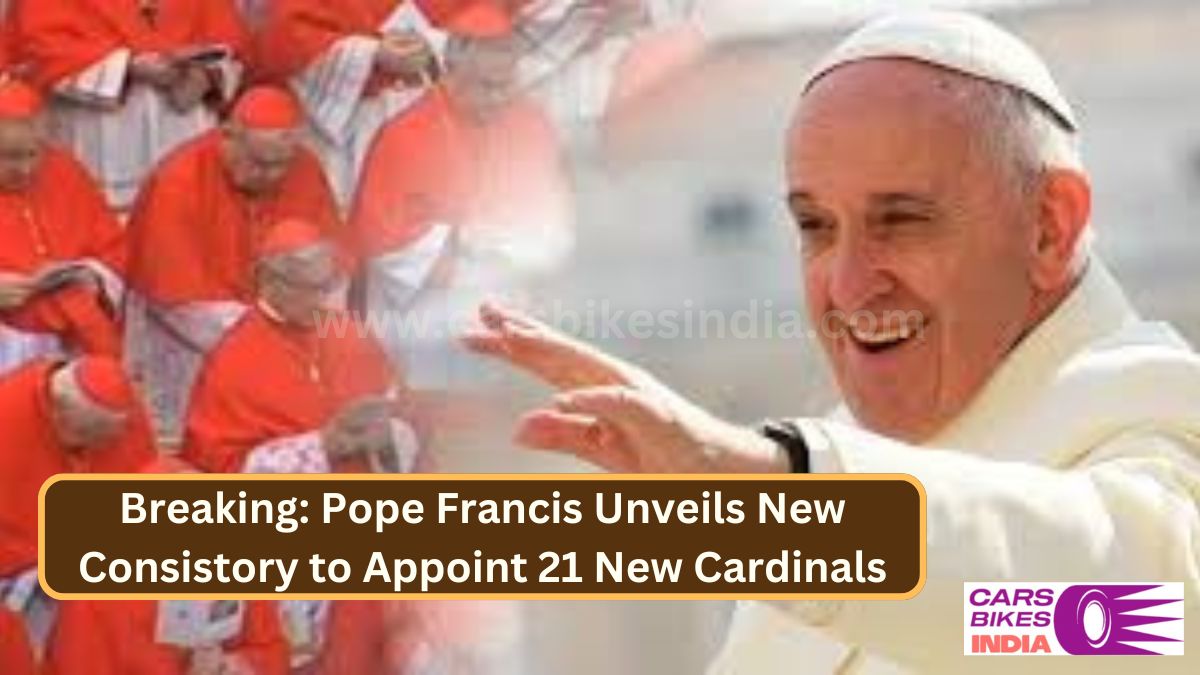In a significant move for the Roman Catholic Church, Pope Francis has announced the creation of 21 new cardinals, reflecting his ongoing mission to shape the future leadership of the Church. The consistory, set to take place soon, will not only strengthen the hierarchy but also continue the vision of a diverse and inclusive Church that Pope Francis has emphasized since the beginning of his papacy. This pivotal announcement further underlines Pope Francis’ dedication to broadening the representation of the Church worldwide.

Pope Francis: A Vision of Diversity and Inclusion
Pope Francis, the leader of the world’s 1.3 billion Catholics, continues to make headlines with his commitment to change. In announcing this consistory, Pope Francis emphasizes values such as inclusion, diversity, and the presence of the Catholic Church in various corners of the globe. He has often selected cardinals from regions with a smaller Catholic presence, thereby promoting diversity and representing the universal nature of the Church. This aligns with Pope Francis’ vision of creating a “Church that is open, merciful, and welcoming to all.”
Since taking office in 2013, Pope Francis has been committed to reforming the Church, from the Curia’s structure to promoting transparency and accountability. His choices in appointing new cardinals reflect his desire to have a more globally representative leadership that reflects the realities and challenges faced by the Church worldwide.
Who Are the New Cardinals?
The list of new cardinals includes representatives from various countries, reflecting the diverse, global reach of the Catholic faith. Among the 21 new cardinals, there are bishops and archbishops from regions such as Latin America, Asia, Africa, and Europe. This geographical diversity demonstrates Pope Francis’ effort to acknowledge and uplift the Church’s presence in regions where it is growing rapidly or facing unique challenges.
For instance, Pope Francis has appointed cardinals from South Sudan and Mongolia, showing the Church’s support in regions that have seen significant hardships and growth. By selecting individuals who are on the front lines of critical social, economic, and spiritual challenges, Pope Francis is sending a powerful message about the Church’s mission to serve and support marginalized communities around the world.
The Significance of the Consistory
A consistory is a formal meeting of the College of Cardinals, and during this event, Pope Francis will officially elevate the new cardinals. The new cardinals, who will be entrusted with the responsibility of advising the Pope, are also eligible to participate in a future conclave to elect the next Pope, provided they are under the age of 80. This makes these appointments crucial for the future direction of the Catholic Church.
By selecting leaders who have demonstrated a strong commitment to social justice, interfaith dialogue, and pastoral care, Pope Francis is laying the foundation for a Church that is more aligned with the needs of today’s faithful. His choice of new cardinals aims to prioritize the values that he has consistently promoted during his papacy — such as compassion, outreach, and dialogue across cultures and religions.
Pope Francis’ Impact on the College of Cardinals
With these new appointments, Pope Francis will have selected a significant majority of the College of Cardinals, thereby shaping the future of the Catholic Church for years to come. As of now, Pope Francis has appointed 99 out of the 132 cardinals who are eligible to vote in a conclave. This influence means that his vision for the Church — one that is open, diverse, and focused on pastoral care — will likely continue long after his tenure as Pope.
The College of Cardinals plays a crucial role in maintaining the Church’s leadership. By appointing individuals who reflect his own values and priorities, Pope Francis ensures that the spirit of reform and the emphasis on marginalized communities will remain a central focus. The new cardinals are likely to be aligned with the Pope’s progressive approach on issues such as climate change, poverty, migration, and interreligious dialogue.
A Global Church Reflecting Today’s World
Pope Francis’ decision to appoint cardinals from underrepresented areas reflects his broader agenda of making the Church truly global. By elevating individuals from parts of the world that are often overlooked, Pope Francis brings greater visibility to issues that affect Catholics in diverse contexts, from the challenges of poverty in the developing world to the need for religious freedom in areas where Christians are a minority.
This new consistory is yet another milestone in Pope Francis’ papacy, which has been marked by a series of groundbreaking decisions and symbolic actions. The creation of these new cardinals is not just about appointing new members of the Church hierarchy; it is about reinforcing a vision for the future — a Church that is inclusive, present in all corners of the world, and deeply engaged with the concerns of humanity.
Conclusion
Pope Francis’ announcement of the creation of 21 new cardinals is a significant step toward shaping the future of the Catholic Church. This consistory will enhance the Church’s leadership by making it more representative of the diverse, global community it serves. Pope Francis’ focus on diversity, inclusion, and social justice ensures that the Catholic Church will continue to evolve in a way that is relevant to the needs of its followers around the world.
By choosing new cardinals from various backgrounds and regions, Pope Francis aims to create a Church that is more in touch with the realities of its people — a Church that listens, understands, and responds. As the consistory approaches, the eyes of the world will be on these new leaders and on how they contribute to the Church’s ongoing mission in these challenging times.
Pope Francis’ influence over the College of Cardinals is pivotal, as these leaders will play an essential role in shaping the future direction of the Church, particularly after his papacy. The emphasis on pastoral care, global inclusion, and addressing social issues underscores Pope Francis’ enduring impact on the Catholic Church, one that will resonate for generations to come.

